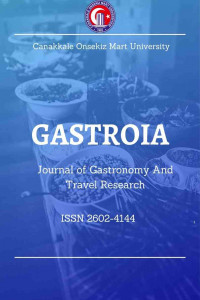BARIN ARKASINDA BİR SANAT: MİKSOLOJİ VE MİKSOLOGLARIN ROLÜ
Miksoloji, içeceklerin tarihçesi, hazırlanış yöntemleri ve kullanılan malzemeleri derinlemesine inceleyerek insanların ilgisini çeker ve lezzet deneyimini ön plana çıkarır. Kökenleri eski uygarlıklara dayanan bu sanat formu, 19. yüzyılda gerçek bir meslek haline gelmiş ve kokteyl kültürünün altın çağına denk gelmiştir. Günümüzde ise miksoloji, yenilikçi teknikler ve malzemelerle yeni ve benzersiz içeceklerin yaratılması sürecidir. Bu araştırma, miksoloji ve miksologların bar arkasındaki rolünü incelemek ve anlamak amacıyla yapılmıştır. Araştırmada yarı-yapılandırılmış görüşme tekniği kullanılarak kartopu örneklem yöntemiyle online mülakatlar gerçekleştirilmiştir. Miksologlar, mesleki gelişim, yaratıcılık, örnek alma ve sosyal bir meslek olması gibi sebeplerle bu kariyeri seçmektedirler. Kendilerini miksolog olarak tanımlarken, tat, koku ve ürün bilgisi, iletişim becerileri ve yaratıcılık gibi yeteneklerini vurgulamaktadırlar. Ayrıca, müşteri kitlesi, maliyet hesabı, trendler ve inovasyon gibi faktörlerin yanı sıra estetik ve iletişim becerilerinin önemli olduğu, sürekli öğrenme ve bilgi paylaşımının da önemli olduğu ortaya çıkmıştır.
AN ART BEHIND THE BAR: MIXOLOGY AND THE ROLE OF MIXOLOGISTS
Mixology draws people's attention and brings the taste experience to the fore by examining the history of the drinks, the methods of preparation and the ingredients used. This art form, which has its origins in ancient civilizations, became a real profession in the 19th century and coincided with the golden age of cocktail culture. Today, mixology is the process of creating new and unique drinks with innovative techniques and ingredients. This research was conducted to examine and understand mixology and the role of mixologists behind the bar. In the research, online interviews were conducted with snowball sampling method using semi-structured interview technique. Mixologists choose this career for reasons such as professional development, creativity, example and being a social profession. When describing themselves as mixologists, they emphasize their talents such as taste, fragrance and product knowledge, communication skills and creativity. In addition, factors such as customer base, cost calculation, trends and innovation, as well as aesthetic and communication skills, and continuous learning and knowledge sharing are also important.
Keywords:
Bar, Staff, Beverage, Mixology, Mixologist,
___
- Altaş, A. ve Cumhur, Ö. (2023). Miksoloji üzerine kavramsal bir araştırma. International Conference on Global Practice of Multidisciplinary Scientific Studies-IV Turkish Republic of Northern Cyprus, April 28-30, 2023. 1717-1731.
- Arnold, D. (2014). Liquid intelligence: the art and science of the perfect cocktail. permissions, W. W. Norton & Company, Inc: New York.
- Bartender Spirits Awards (2023). What’s the difference between a mixologist and a bartender?. https://bartenderspiritsawards.com/en/blog/insights-1/whats-the-difference-between-a-mixologist-and-a-bartender-72.htm 10.06.2023 tarihinde erişilmiştir.
- Çöp, S. (2020). Miksoloji. M. Sarıışık, G. Özbay ve V. Ceylan (Eds.). A’dan z’ye gastronomi sözlüğü içinde (s. 372-373). Detay Yayıncılık: Ankara.
- Day, A., Fauchald, N. ve Kaplan, D. (2018). Cocktail codex: fundamentals, formulas, evolutions. penguin random House LLC: New York.
- Degroff, D. (2002). The craft of the cocktail: everything you need to know to be a master bartender, with 500 recipes. Clarkson Potter Publishers: New York.
- Field, K. B. (2017). Drinkologist: mixology basics with 50 recipes. Kindle Edition.
- Gately, I. (2008). Drink: a cultural history of alcohol. Gotham Books: USA.
- Gruber, F. (2014). Startup mixology: tech cocktail’s guide to building, growing, and celebrating startup success. Wiley: New Jersey.
- Katsigris, C. ve Thomas, C. (2007). The bar & beverage book. John Wiley & Sons Inc.: Canada.
- Kök, A. ve Akyurt Kurnaz, H. (2021). Banket satış, servis ve mutfak personeli. (S, Şengül Ed.), Banket Satış ve Organizasyonu içinde. 39-55. Detay Yayıncılık: Ankara.
- Matejka, A. (2009). Mixology. Penguin Books: London.
- Ocejo, R. E. (2010).What’ll it be? cocktail bartenders and the meanings and the redefinition of service in the creative. Economy, City, Culture and Society. 1(4). 179-184.
- Ocejo, R. E. (2012). At your service: the meanings and practices of contemporary bartenders. European Journal of Cultural Studies. 15(5). 642-658.
- Ranasinghe, N., Nguyen, T. N. T., Liangkun, Y., Lin, L.-Y., Tolley, D. ve Do, E. Y.-L. (2017). Vocktail. Proceedings of the 2017 ACM on Multimedia Conference-MM’17. https://doi.org/10.1145/3123266.3123440
- Simmons, M. (2011). DIY cocktails: a simple guide to creating your own signature drinks. Avon. Adams Media: USA.
- Stewart, A. (2013). The drunken botanist: the plants that create the world’s great drinks. Algonquin Books of Chapel Hill: New York.
- The American Heritage Dictionary. (2023). https://ahdictionary.com/word/search.html?q=mixology. 10.06.2023 tarihinde erişildi.
- Wondrich, D. (2007). Imbibe!: from absinthe cocktail to whiskey smash, a salute in stories and drinks to “Professor” Jerry Thomas, Pioneer of the American Bar. A Perigee Book: USA.
- Yörükoğlu, İ. ve Yörükoğlu, M. A. (1998). Konaklama-ağırlama işletmelerinde servis yönetimi. Detay Yayıncılık: Ankara.
- ISSN: 2602-4144
- Yayın Aralığı: Yılda 2 Sayı
- Başlangıç: 2017
- Yayıncı: Çanakkale Onsekiz Mart Üniversitesi
Sayıdaki Diğer Makaleler
YİYECEK İÇECEK İŞLETMELERİNDEKİ PERSONEL DAVRANIŞLARININ MÜŞTERİNİN YEME İÇME DENEYİMİNE ETKİSİ
TÜRKİYE’NİN ARI TURİZMİNDE REKABET EDEBİLİRLİĞİ
Büşra UZUN, Emine YILMAZ, Hüseyin ÇEKEN
STRATEJİK YÖNETİM YAKLAŞIMININ MENÜ PLANLAMADA UYGULANABİLİRLİĞİ: BİR MODEL ÖNERİSİ
YÖRESEL YEMEKLERDE NEOFOBİ ETKİSİ
Mahmut TOPÇU, Özlem ÖZER ALTUNDAĞ
ÜRÜN YAŞAM DÖNGÜSÜ TEORİSİ: NOSTALJİK YİYECEKLERİN LEZZET HAFIZASINDAKİ YERİ
THE FORGOTTEN TASTE OF ERZINCAN: ZARAFAT
TURİST REHBERLERİNİN KARŞILAŞTIĞI ETİK DIŞI DAVRANIŞLAR
